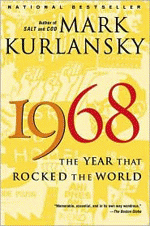I have just read a
fascinating 2004 book by Mark Kurlansky regarding the global
liberation struggles that occurred in 1968. For progressives of my generation,
this was a year of great hope and inspiration - one that saw millions of
students and workers protesting in the streets. I bought 1968: the Year
That Rocked the World in the hope these historic struggles might hold
lessons for contemporary activists seeking to reclaim so-called western
democracies that are really corporate-run fascist states ("Fascism should more
properly be called corporatism because it is the merger of state and corporate
power." - Benito Mussolini)
How the Mainstream Media Shapes Memory
Up until now, I have viewed the political significance of the sixties with the tunnel vision of someone whose recollection has been shaped by the corporate media. Obviously Kurlansky's book has greatly broadened my perspective. Previously I only associated two mass movements - the US anti-war movement and the French general strike - with the year 1968. Somehow I forgot there were riots in forty US inner cities that year. Although I clearly recall Alexander Dubcek and Prague Spring, I also forget that this, too, occurred in 1968. This was the inspirational movement that led Czechoslovakia to relax harsh censorship laws and allowed the flourishing of freedom of the speech, press, and artistic expression
As Kurlansky points out, there were uprisings in at least 19 countries - on both sides of the Iron Curtain - in 1968. Moreover students and workers in different countries learned from, copied, and supported movements in other countries.
Countries Kurlansky describes with uprisings in 1968:
- US
- France
- Czechoslovakia
- Poland
- Yugoslavia
- Romania
- Italy
- West Germany
- East Germany
- Spain
- UK
- Russia
- Nigeria
- Palestine
- Mexico
- Brazil
- Ecuador
- Chile
- Uruguay
In addition to his emphasis on the global nature of the 1968 political movement, Kurlansky stresses two other important themes in 1968: 1) the secret to a successful social movement is getting media attention and 2) the secret to getting media attention is violence.
Media Attention: the Role of Violence
The most eye-opening section of Kurlansky's 1968 is Chapter 3, in which he discusses the importance of violence and the rhetoric of violence in attracting media attention. As a veteran of the 1999 Battle of Seattle (the Seattle anti-WTO protest), I can't help but agree. If it hadn't been for a group of Black Bloc anarchists who smashed store front windows at MacDonald's and Nike, our 75,000 strong protest would never have made the major dailies, much less the six o'clock news. To give the Seattle police their due, the police riot also attracted significant media attention.
Violence=Publicity
According to Kurlansky, no one understood the importance of the media in movement building better than Mohandas K. Gandhi, who inspired the current non-violent movement. Gandhi went to great lengths to obtain Indian, British, and American coverage of every protest he organized. In fact it was Gandhi himself who first spoke of the value of British violence in enticing the media to cover the Quit India movement.
Kurlansky goes on to describe a police chief who thwarted Martin Luther King's organizing efforts in Albany , Georgia by studying his non-violent tactics and countering them with non-violent law enforcement tactics. As a result, King's Albany campaign was a total failure. Because there was no police violence, it received no national media attention. And without media attention, King was unable to pressure Attorney General Bobby Kennedy to enforce federal civil rights laws there.
After Albany , King and other civil rights leaders deliberately targeted towns with hothead police chiefs and angry volatile mayors. Korlansky relates an incident in 1965 in which a King protester named Annie Lee Cooper punched the sheriff and then dared him to hit her. The photo of Sheriff Clark clubbing a defenseless woman made the front page of newspapers throughout the country.
Later in the book, Kurlansky describes the most highly publicized student antiwar protests of 1968. Here again, he stresses that they only took on national importance because of the repressive (sometimes violent) measures government and university administrators (particularly at Columbia University and University of California-Berkeley) took to stop them. Had the authorities merely ignored the student protests and sit-ins, they never would have received the national media attention that made them historic events.
The 1968 Democratic Convention
(Note: You can view every article as one long page if you sign up as an Advocate Member, or higher).






